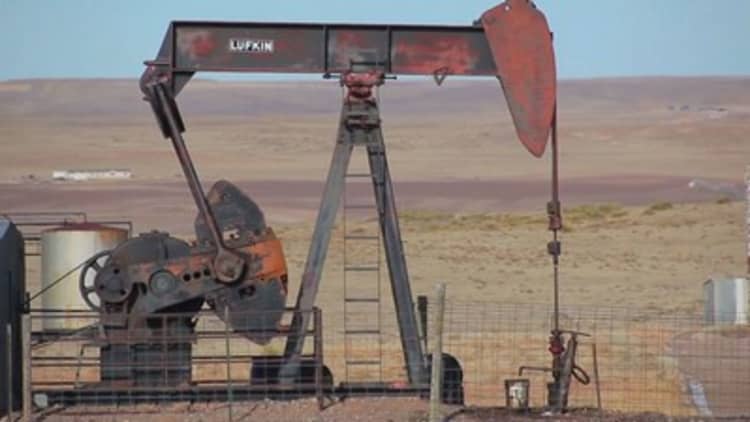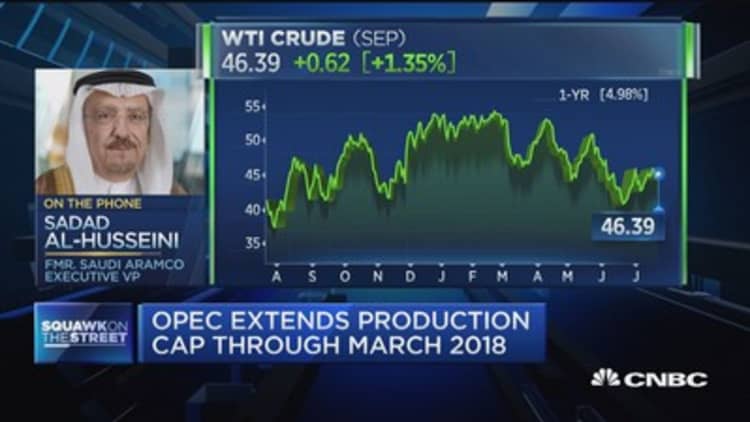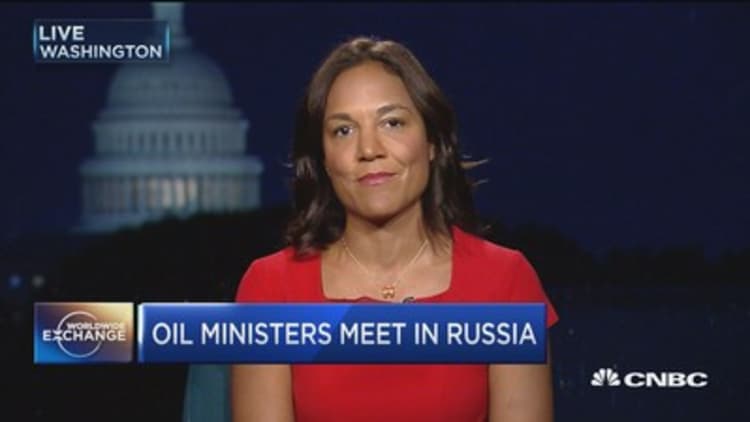
Oil prices extended gains after closing at a seven-week high on Tuesday after an industry group reported a huge drop in U.S. crude stockpiles.
U.S. crude inventories fell by 10.2 million barrels in the week ending July 21 to 487 million, the American Petroleum Institute reported, compared with expectations for a decrease of 2.6 million barrels.
The U.S. Energy Information Administration releases official government data on Wednesday morning.
U.S. West Texas Intermediate (WTI) futures were up $2.11, or 4.6 percent, to $48.45 a barrel by 4:42 p.m. ET. They climbed $1.55, or 3.3 percent, to end Tuesday's session at $47.89, its best closing level since June 7.
Global benchmark Brent crude for September delivery was up $2.11, or 4.3 percent, at $50.71 a barrel, after touching a seven-week intraday high in Tuesday's session.

Oil prices rose after Saudi Arabia pledged to curb exports next month and OPEC called on several members to boost compliance with output cuts.
At a meeting in the Russian city of St. Petersburg on Monday, the Organization of the Petroleum Exporting Countries (OPEC) and non-OPEC producers discussed extending their deal to cut output by 1.8 million barrels per day (bpd) beyond March 2018 if necessary.
Saudi Energy Minister Khalid al-Falih added his country would limit its crude exports to 6.6 million bpd in August, almost 1 million bpd below levels of a year ago.
Nigeria voluntarily agreed to join the deal by capping or cutting its output from 1.8 million bpd, once it stabilizes at that level. Nigeria, which has been producing 1.7 million bpd recently, had been exempt from the output cuts.
In a sign that production from the OPEC member remains susceptible to disruptions, Royal Dutch Shell's Nigerian subsidiary said on Monday that it had shut its 180,000 bpd Trans Niger pipeline because of a leak on July 21.
Russian Energy Minister Alexander Novak said an additional 200,000 bpd of oil could be removed from the market if there is 100 percent compliance with the OPEC-led deal.
"In our view ... these meetings were aimed at saving face and diverting the market's attention away from Iraq's poor compliance, shale's resilience and Libya's and Nigeria's markedly higher output," Barclays said.

OPEC said that stocks held by industrial nations had fallen by 90 million barrels in the first six months of the year but were still 250 million barrels above the five-year average, which is the target level for OPEC and non-OPEC members.
On Monday, Anadarko Petroleum posted a larger-than-expected quarterly loss and said it would cut its 2017 capital budget by $300 million because of depressed oil prices, the first major U.S. oil producer to do so.
Earlier, Halliburton's executive chairman said growth in North America's rig count was "showing signs of plateauing."
"Companies are not drilling as fast they had been in the beginning of 2017," said Mark Watkins, regional investment manager at U.S. Bank.
China's crude imports will exceed 400 million tons (8 million bpd) this year and likely grow by double digits next year, a Sinopec Group executive said.

